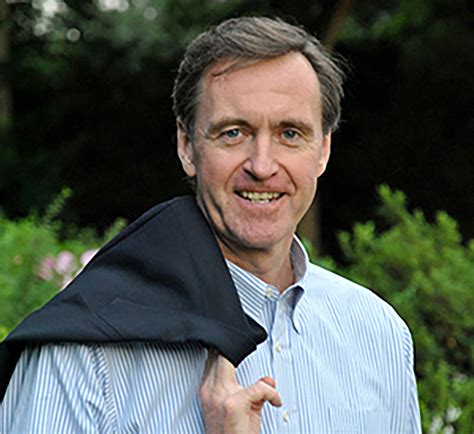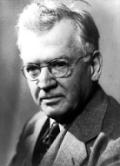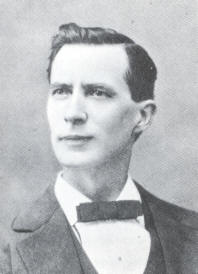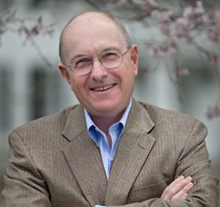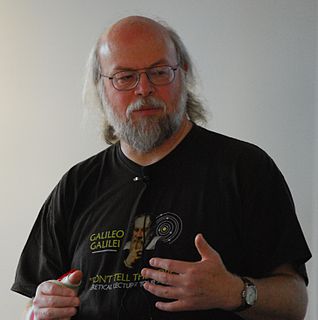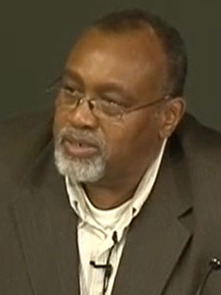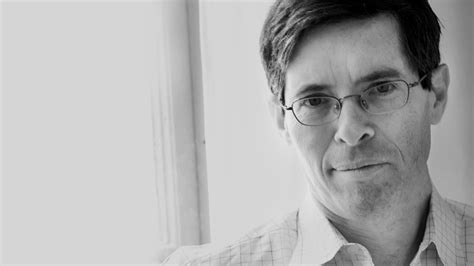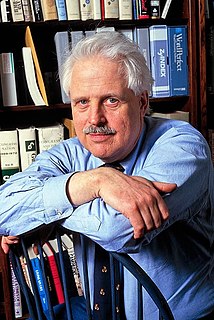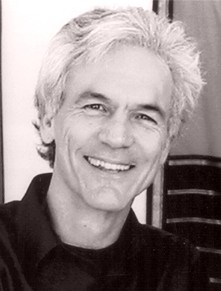Top 1200 Enterprise Quotes & Sayings - Page 20
Explore popular Enterprise quotes.
Last updated on April 20, 2025.
It's a slow process, but it is scary, because if someone can control your energy sources, they can control you. We are already being told what light bulbs we can and cannot use...through legislation. We are being forced to fund research into alternative energies sources that are inefficient, and that cause the price of food, energy, and everything else to rise...through legislation...rather than allow free enterprise to allocate funds to those energy sources that will survive through good old American innovation!
The church is like any large corporation in one respect. In its early days, either the early church or the early years of Microsoft, you see all kinds of creativity, innovation, invention, people have nothing to lose, they're trying to find what works. Then you wake up and you're a vast enterprise, and it's very hard, when you have all kinds of buildings and structures and hierarchy and so on, to hang on to these very creative impulses that helped you get your great success in the first place. As a church we're going to have to figure a way out from under this.
However, the balloon, lightened of heavy articles, such as ammunition, arms, and provisions, had risen into the higher layers of the atmosphere, to a height of 4,500 feet. The voyagers, after having discovered that the sea extended beneath them, and thinking the dangers above less dreadful than those below, did not hesitate to throw overboard even their most useful articles, while they endeavored to lose no more of that fluid, the life of their enterprise, which sustained them above the abyss.
We call it EPCOT, spelled E-P-C-O-T: Experimental Prototype Community of Tomorrow. Here it is in larger scale. EPCOT will take its cue from the new ideas and new technologies that are now emerging from the creative centers of American industry. It will be a community of tomorrow that will never be completed, but will always be introducing and testing and demonstrating new materials and systems. And EPCOT will always be a showcase to the world for the ingenuity and imagination of American free enterprise.
I believe that the free enterprise system is the greatest engine of prosperity the world's ever known. I believe in self-reliance and individual initiative and risk-takers being rewarded. But I also believe that everybody should have a fair shot and everybody should do their fair share and everybody should play by the same rules, because that's how our economy's grown. That's how we built the world's greatest middle class.
The left's obsession with corporations as a spawn of evil is pathological paranoia. A corporation is just one form of organizing a private business enterprise for purposes of limiting personal liability, issuing stock, filing financial reports and paying taxes. Other forms include partnerships and sole proprietorships. Are they less evil? You buy your groceries from corporations, your cars, newspapers, cellphones, clothing and exercise equipment. Your parents and children work for corporations. Are they evil?
Once the threshold is crossed when there is a self-sustaining level of life in space, then life's long-range future will be secure irrespective of any of the risks on Earth. Will this happen before our technological civilization disintegrates, leaving this as a might-have-been? Will the self-sustaining space communities be established before a catastrophe sets back the prospect of any such enterprise, perhaps foreclosing it forever? We live at what could be a defining moment for the cosmos.
My upbringing was pretty interesting. It was a rigorous, intellectual upbringing, but with the idea that we were a part of an important and legitimate enterprise. What that meant was sitting around the dinner table from a really early age with people from all different backgrounds who believed in God. When I was reporting in the wake of September 11th in Iraq and elsewhere, I felt I had the capacity to talk to people whose beliefs might sound outlandish to more secular journalists. I felt like I could be a translator between those two worlds.
Capitalism may even be identical with the restraint, or at least a rational tempering, of this irrational impulse. But capitalism is identical with the restraint, or at least a rational tempering, of this irrational impulse. But capitalism is identical with the pursuit of profit, and forever renewed profit, by means of continuous, rational, capitalistic enterprise.
Every schoolchild knows that Columbus set out across the sea to prove that the world was round. But the belief in a spherical earth had a long and illustrious pedigree, as Columbus himself was well aware. . . . "The second reason that inspired the Admiral [Columbus] to launch his enterprise and helped justify his giving the name 'Indies' to the lands which he discovered was the authority of many learned men who said that one could sail westward from the western end of Africa and Spain to the eastern end of India, and that no great sea lay between."
When you coach and teach leadership, most people think about them. It's like you're the leader and how do you influence them. Clearly, leaders do take their followers, their flock, their enterprise, their business - whatever - hopefully to a better place. But I think the foundation of what makes really great leaders is they lead themselves, and they're conscious about knowing themselves and coaching and leading themselves in a very profound way. The simplest of us talk to ourselves. The question is, "Do we really lead ourselves?"
The most important difference between these early American families and our own is that early families constituted economic unitsin which all members, from young children on up, played important productive roles within the household. The prosperity of the whole family depended on how well husband, wife, and children could manage and cultivate the land. Children were essential to this family enterprise from age six or so until their twenties, when they left home.
No matter what the cause, even though it be to conquer with tanks and planes and modern artillery some defenseless black population, there will be no lack of poets and preachers and essayists and philosophers to invent the necessary reasons and gild the infamy with righteousness. To this righteousness there is, of course, never an adequate reply. Thus a war to end poverty becomes an unanswerable enterprise. For who can decently be for poverty? To even debate whether the war will end poverty becomes an exhibition of ugly pragmatism and the sign of an ignoble mind.
Our example - and commitment - to freedom has changed the world. But along with the genius of our Declaration of Independence, our Constitution, and our Bill of Rights, is the equal genius of our economic system. Our Founding Fathers endeavored to create a moral and just society like no other in history, and out of that grew a moral and just economic system the likes of which the world had never seen. Our freedom, what it means to be an American, has been defined and sustained by the liberating power of the free enterprise system.
It is time that capital and labor realized that their interests are really comutual, as interdependent as the brain and the body; time they ceased their fratricidal strife and, uniting their mighty forces under the flag of Progress, completed the conquest of the world and doomed Poverty, Ignorance and Vice... Unless labor is employed, capital cannot increase - it cannot concentrate. Unless property rights are held inviolable and capital thereby encouraged to high enterprise, labor is left without a lever with which to lift itself to perfect life and must sink back to barbarism.
God sends children for another purpose than merely to keep up the race - to enlarge our hearts; and to make us unselfish and full of kindly sympathies and affection; to give our shoulds higher aims; to call out all our faculties to extended enterprise and exertion and to bring round our firesides bright faces, happy smiles, and loving, tender hearts. My soul blesses the great Father, every day, that he has gladdened the earth with little children
A Call for Revolution, 1993 Libertarianism is rejected by the modern left - which preaches individualism but practices collectivism. Capitalism is rejected by the modern right - which preaches enterprise but practices protectionism. The libertarian faith in the mind of man is rejected by religionists who have faith only in the sins of man. . . . The libertarian insistence that each man is a sovereign land of liberty, with his primary allegiance to himself, is rejected by patriots who sing of freedom but also shout of banners and boundaries.
Too many companies these days can't tell the difference between good profits and bad.... By now you're probably wondering how in heaven's name profit, that holy grail of the business enterprise, can ever be bad. Short of outright fraud, isn't one dollar of earnings as good as another? Certainly, accountants can't tell the difference between good and bad profits. They all look the same on an income statement. While bad profits don't show up on the books, they are easy to recognize. They're profits earned at the expense of customer relationships.
What keeps my flame burning is, first, I'm ornery and persistent. I don't like giving up on things and I believe in my band and I just happen to have the sort of personality that really likes to see things to the bitter end. The second reason is the incredible people I've been fortunate to meet as a result of pursuing this insane, money-hemorrhaging enterprise. Literally every time I release a well-reviewed, poor-selling record, the net result is that I end up meeting more kind, like-minded, creative and brilliant people. That's really all the reward I need.
In the Java world, security is not viewed as an add-on a feature. It is a pervasive way of thinking. Those who forget to think in a secure mindset end up in trouble. But just because the facilities are there doesn't mean that security is assured automatically. A set of standard practices has evolved over the years. The Secure Coding Standard for Java is a compendium of these practices. These are not theoretical research papers or product marketing blurbs. This is all serious, mission-critical, battle-tested, enterprise-scale stuff.
THE NINETEENTH CENTURY SPREAD OF CHRISTIANITY WAS DUE PRIMARILY TO A NEW BURST OF RELIGIOUS LIFE EMANATING FROM THE CHRISTIAN IMPULSE. . . . NEVER IN ANY CORRESPONDING LENGTH OF TIME HAD THE CHRISTIAN IMPULSE GIVEN RISE TO SO MANY NEW MOVEMENTS. NEVER HAD IT HAD QUITE SO GREAT AN EFFECT UPON WESTERN EUROPEAN PEOPLES. IT WAS FROM THIS ABOUNDING VIGOR THAT THERE ISSUED THE MISSIONARY ENTERPRISE WHICH DURING THE NINETEENTH CENTURY SO AUGMENTED THE NUMERICAL STRENGTH AND THE INFLUENCE OF CHRISTIANITY.
All the alleged key causes of SOE [State-Owned Enterprise] inefficiency - the principal-agent problem, the free-rider problem and the soft budget constraint - are, while real, not unique to state-owned enterprises. Large private-sector firms with dispersed ownership also suffer from the principal-agent problem and the free-rider problem. So, in these two areas, forms of ownership do matter, but the critical divide is not between state and private ownership - it is between concentrated and dispersed ownerships.
If we are perceived by the rest of the world as employing a double standard in the way that we pursue the war on terror, if we are seen as imposing on other countries' nationals, burdens that we wouldn't be able to tolerate ourselves, then we sacrifice the legitimacy of the enterprise. And I don't think the world considers it illegitimate for the United States to seek to protect itself from another attack like the one we suffered on 9/11, but I think the world does think it is illegitimate to do so by sacrificing their citizens' rights and not our citizens' rights.
Environmental history was . . . born out of a moral purpose, with strong political commitments behind it, but also became, as it matured, a scholarly enterprise that had neither any simple, nor any single, moral or political agenda to promote. Its principal goal became one of deepening our understanding of how humans have been affected by their natural environment through time and, conversely, how they have affected that environment and with what results.
There is no "scientific worldview" just as there is no uniform enterprise "science" - except in the minds of metaphysicians, school masters, and scientists blinded by the achievements of their own particular niche... There is no objective principle that could direct us away from the supermarket "religion" or the supermarket "art" toward the more modern, and much more expensive supermarket "science." Besides, the search for such guidance would be in conflict with the idea of individual responsibility which allegedly is an important ingredient of a "rational" or scientific age.
It has been remarked that when one passes among the patients of the psychiatric ward, he encounters among the several sufferers every aspect of normal personality in morbid exaggeration. ... As one passes through the modern centers of enterprise and of higher learning, he is met with similar autonomies of development. ... The scientist, the technician, the scholar, who have left the One for the Many are puffed up with vanity over their ability to describe precisely some minute portion of the world. Men so obsessed with fragments can no more be reasoned with than other psychotics.
The great end of prudence is to give cheerfulness to those hours which splendour cannot gild, and acclamation cannot exhilarate; those soft intervals of unbended amusement, in which a man shrinks to his natural dimensions, and throws aside the ornaments or disguises which he feels in privacy to be useless incumbrances, and to lose all effect when they become familiar. To be happy at home is the ultimate result of all ambition, the end to which every enterprise and labour tends, and of which every desire prompts the prosecution.
The history of the welfare state is the history of public enterprise pushing out private organization. The impact was largely unintentional, but natural and inevitable. Higher taxes left individuals with less money to give; government's assumption of responsibility for providing welfare shriveled the perceived duty of individuals to respond to their neighbors' needs; and the availability of public programs gave recipients an alternative to private assistance, one which did not challenge recipients to reform their destructive behavior.
Nature always takes you at your own valuation. Believe you are the child of God-really believe it. Believe that you express Divine Life, Divine Truth, and Divine Love. Believe that Divine Wisdom guides you. Believe that God is your supply. Believe that God is helping and blessing humanity through you. Believe that you are a special enterprise on the part of God and that he is opening your way-and what you really believe, that you will demonstrate.
Three strikes' laws make no sense as policy. They are more about the politicians responding to the people's desire to see their fury at social dysfunction reflected in the law. Our sentences are way too long. We need to look at the war on drugs, which is to say we need to look and this is easier said than done. Once again, politically, not an easy lift at all. Nevertheless, our policy is self-defeating. We're not keeping people from using the substances. We're creating a huge black market, just like we did under prohibition, which attracts all kinds of criminal enterprise.
How did I get into the world? Why was I not asked about it and why was I not informed of the rules and regulations but just thrust into the ranks as if I had been bought by a peddling shanghaier of human beings? How did I get involved in this big enterprise called actuality? Why should I be involved? Isn't it a matter of choice? And if I am compelled to be involved, where is the manager—I have something to say about this. Is there no manager? To whom shall I make my complaint?
Why pray for the Kingdom of God to come unless you have in your heart a desire and a willingness to aid in its establishment? Praying for His will to be done and then not trying to live it, gives you a negative answer at once. You would not grant something to a child who showed that attitude towards a request he is making of you. If we pray for the success of some cause or enterprise, manifestly we are in sympathy with it. It is the height of disloyalty to pray for God's will to be done, and then fail to conform our lives to that will.
Buffett's uncommon urge to chronicle made him a unique character in American life, not only a great capitalist but the Great Explainer of American capitalism. He taught a generation how to think about business, and he showed that securities were not just tokens like the Monopoly flatiron, and that investing need not be a game of chance. It was also a logical, commonsensical enterprise, like the tangible businesses beneath. He stripped Wall Street of its mystery and rejoined it to Main Street -- a mythical or disappearing place, perhaps, but one that is comprehensible to the ordinary American.
I do not know how history will judge me, but let me say that I've spent a lot of time and energy trying to transform the Tatas from a patriarchal concern to an institutional enterprise. It would, therefore, be a mark of failure on my part if it were perceived that Ratan Tata epitomises the Group's success. What I have done is establish growth mechanisms, play down individuals and play up the team that has made the companies what they are. I, for one, am not the kind who loves dwelling on the 'I'. If history remembers me at all, I hope it will be for this transformation.
Mysticism is a rational enterprise. Religion is not. The mystic has recognized something about the nature of consciousness prior to thought, and this recognition is susceptible to rational discussion. The mystic has reasons for what he believes, and these reasons are empirical. The roiling mystery of the world can be analyzed with concepts (this is science), or it can be experienced free of concepts (this is myticism). Religion is nothing more than bad concepts held in place of good ones for all time. It is the denial-at once full of hope and full of fear-of the vastitude of human ignorance.
The student who would build his knowledge on solid foundations, and proceed by just degrees to the pinnacles of truth, is directed by the great philosopher of France to begin by doubting of his own existence. In like manner, whoever would complete any arduous and intricate enterprise, should, as soon as his imagination can cool after the first blaze of hope, place before his own eyes every possible embarrassment that may retard or defeat him. He should first question the probability of success, and then endeavour to remove the objections that he has raised.
For my part, I rather distrust men or concerns that rise up with the speed of rockets. Sudden rises are sometimes followed by equally sudden falls. I have most faith in the individual or enterprise that advances step by step. A mushroom can spring up in a day; an oak takes 50 years or more to reach maturity. Mushrooms don't last; oaks do. The real cause for an enormous number of business failures is premature over-expansion, attempting to gallop before learning to creep. Sudden successes often invite sudden reverses.
EMA research evidences strong and growing interest in leveraging log data across multiple infrastructure planning and operations management use cases. But to fully realize the potential complementary value of unstructured log data, it must be aligned and integrated with structured management data, and manual analysis must be replaced with automated approaches. By combining the RapidEngines capabilities with its existing solution, SevOne will be the first to truly integrate log data into an enterprise-class, carrier-grade performance management system.
Creation science has not entered the curriculum for a reason so simple and so basic that we often forget to mention it: because it is false, and because good teachers understand why it is false. What could be more destructive of that most fragile yet most precious commodity in our entire intellectual heritage-good teaching-than a bill forcing our honorable teachers to sully their sacred trust by granting equal treatment to a doctrine not only known to be false, but calculated to undermine any general understanding of science as an enterprise?.
I believe that the creative impulse is natural in all human beings, and that it is particularly powerful in children unless it is suppressed. Consequently, one is behaving normally and instinctively and healthily when one is creating - literature, art, music, or whatever. An excellent cook is also creative! I am disturbed that a natural human inclination [creative work] should, by some Freudian turn of phrase, be considered compulsive - perhaps even pathological. To me this is a complete misreading of the human enterprise. One should also enjoy one's work, and look forward to it daily.
I hear Republicans and Libertarians and so forth talking about property rights, but they stop talking about property rights as soon as the subject of American Indians comes up, because they know fully well, perhaps not in a fully articulated, conscious form, but they know fully well that the basis for the very system of endeavor and enterprise and profitability to which they are committed and devoted accrues on the basis of theft of the resources of someone else. They are in possession of stolen property. They know it. They all know it. It's a dishonest endeavor from day one.
He received me not only cordially, but he was also full of confidence with respect to the war. His first words, after he had welcomed me, were as follows: 'Well, Dr. Weismann, we have as good as beaten them already.' I...thanked him for his constant support for the Zionist course. 'You were standing at the cradle of this enterprise.' I said to him, 'and hopefully you will live to see that we have succeeded.' Adding that after the war we would build up a state of three to four million Jews in Palestine, whereupon he replied: 'Yes, go ahead, I am full in agreement with this idea.'
Let's face it, the romantic scene between the Romulan Commander and Spock [in “The Enterprise Incident”] was totally out of context. Any Romulan worth her salt would have instantly suspected Spock because they are related races. That was wrongmy biggest objection is the scene between Spock and the woman, because I really did not believe it. And I did not believe that the Romulan did not suspect Spock of something underhanded. She does know enough about Vulcan and Vulcans to know that something's afoot.
Now more than ever the people are responsible for the character of their Congress. If that body be ignorant, reckless, and corrupt, it is because the people tolerate ignorance, recklessness, and corruption. If it be intelligent, brave, and pure, it is because the people demand these high qualities to represent them in the national legislature. . . . If the next centennial does not find us a great nation . . . it will be because those who represent the enterprise, the culture, and the morality of the nation do not aid in controlling the political forces.
Capitalism is chronically unstable.Boom and bust has always marked capitalism in the United States. There were panics in 1785, 1791, 1819, 1857, 1869, 1873, 1907, 1929 and 1987.In economies and politics, as in war, an astonishing number of people die, like the man on the railway crossing, defending their right of way. This is a poorly developed instinct in Switzerland. No country so firmly avows the principles of private enterprise but in few have the practical concessions to socialism been more numerous and varied.
Our Founding Fathers well understood that concentrated power is the enemy of liberty and the rights of man. They knew that the American experiment in individual liberty, free enterprise and republican self-government could succeed only if power were widely distributed. And since in any society social and political power flow from economic power, they saw that wealth and property would have to be widely distributed among the people of the country. The truth of this insight is immediately apparent.
The late '60s and the '70s, a lot of this really beautiful equipment was being made and installed into studios around the world and the Neve boards were considered like the Cadillacs of recording consoles. They're these really big, behemoth-looking recording desks; they kind of look like they're from the Enterprise in Star Trek or something like that. They're like a grayish color, sort of like an old Army tank with lots of knobs, and to any studio geek or gear enthusiast it's like the coolest toy in the world.
If the Treasury were to fill old bottles with bank-notes, bury them at suitable depths in disused coal-mines which are then filled up to the surface with town rubbish, and leave it to private enterprise on well-tried principles of laissez-faire to dig the notes up again (the right to do so being obtained, of course, by tendering for leases of the note-bearing territory), there need be no more unemployment and, with the help of repercussions, the real income of the community, and its capital wealth, would probably become a good deal greater than it actually is.
Summer, with its dog days, its vacations, its distractions, is over. We have had our holidays, our rest, our recreation. The fall season, with its new opportunities for effort, enterprise and achievement, is upon us. Let us rip off our coats and get down to business. We may have allowed pessimism to grip us during the summer months. We may even have allowed laziness to enter our bones. Now it is up to us to throw off both lassitude and pessimism. The time has come for action, for aggressiveness.
There is an alternative to terror. It is called, in the political order, democracy. In the economic order, it is called the dynamic enterprise economy. (...) It empowers poor people from the bottom up. (...) A dynamic economic sector is the poor's best hope of escaping the prison of poverty. It is the only system so far known to human beings to take poor people and make them, quite soon, middle class, and some of them even (horrors!) rich.
There are some things in the world we can't change- gravity, entropy, the speed of light, and our biological nature that requires clean air, clean water, clean soil, clean energy and biodiversity for our health and well-being. Protecting the biosphere should be our highest priority or else we sicken and die. Other things, like capitalism, free enterprise, the economy, currency, the market, are not forces of nature, we invented them. They are not immutable and we can change them. It makes no sense to elevate economics above the biosphere.
We preach free enterprise capitalism. We believe in it, we give our lives in war for it, but the closest most of us come to profiting from it are a few miserable shares of stock in a company that doesn't pay large enough dividends to keep a small mouse in cheese. The truth is, most of us are job serfs. At a time when invested capital returns 20 to 30 percent, we have no capital. We only have our wages and salaries, and a debt so high that something like 20c on every dollar we earn is spent to pay off what we owe.
The creation story unfurling within the scientific enterprise provides the fundamental context, the fundamental arena of meaning, for all the peoples of the Earth. For the first time in human history, we can agree on the basic story of the galaxies, the stars, the planets, minerals, life forms, and human cultures. This story does not diminish the spiritual traditions of the classical or tribal periods of human history. Rather, the story provides the proper setting for the teachings of all traditions, showing the true magnitude of their central truths.
In order to carry through any undertaking in family life, there must necessarily be either complete division between the husband and wife, or loving agreement. When the relations of a couple are vacillating and neither one thing nor the other, no sort of enterprise can be undertake. Many families remain for years in the same place, though both husband and wife are sick of it, simply because there is neither complete division nor agreement between them.
Nothing sweeter than to drag oneself along behind events; and nothing more reasonable. But without a strong dose of madness, no initiative, no enterprise, no gesture. Reason: the rust of our vitality. It is the madman in us who forces us to adventure; once he abandons us, we are lost; everything depends on him, even our vegetative life; it is he who invites us, who obliges us to breathe, and it is also he who forces our blood to venture through our veins. Once he withdraws, we are alone indeed! We cannot be normal and alive at the same time.
Every system tries to get people to conform to support that system. That goes for communism, socialism, free enterprise, or any other civilization. If they don't demand loyalty, they can't keep their civilization together. So what they do is they teach things that would support an established system. We do not advocate an established system. TVP talks of an emergent system into state of change. So that we always prepare people for the next changes coming ahead. So that people will not cling to the past.
While sabotaging our reliable energy sources, Obama is also throwing as much federal money as he can at failed green energy projects, which are so ill-conceived that a reasonable person might conclude this goal is to waste money. Solyndra wasn't the only such failed enterprise, as we've shown. There were a dozen others, and despite these failures and the unconscionable waste, he has revealed nothing but a defiant determination to double down and spend more on other such projects. It's mind-blowing.
So the Bush-Obama administration has taken a fiscal stance diametrically opposed to that of the patron saint of free enterprise. While escalating war in Afghanistan and maintaining over 850 military bases around the world, the administration has run up the national debt that Smith decried. By shifting the tax burden off property and off rent-seeking monopolies - above all, off the financial sector - this policy has raised America's cost of living and doing business, thereby undercutting its competitive power and running up larger and larger foreign debt.
Chances are, the aliens will not want to land on our backyard, or even the White House lawn, with their flying saucers. They may have tiny, robotic self-replicating probes which can reach near light speed and can proliferate around the galaxy. So instead of the Enterprise and huge star ships, the aliens might actually send tiny probes to explore the universe. One might land on our lawn and we won't even know.
My deeply held belief is that if a god of anything like the traditional sort exists, our curiosity and intelligence are provided by such a god. We would be unappreciative of those gifts (as well as unable to take such a course of action) if we suppressed our passion to explore the universe and ourselves. On the other hand, if such a traditional god does not exist, our curiosity and our intelligence are the essential tools for managing our survival. In either case, the enterprise of knowledge is consistent with both science and religion, and is essential for the welfare of the human species.

